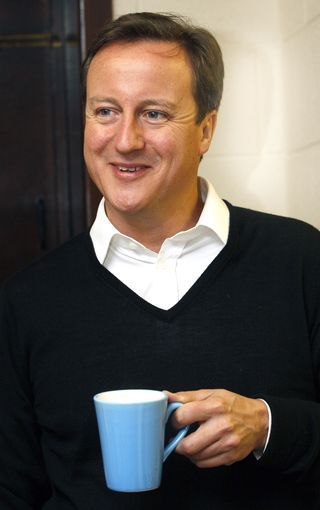How to be biased
 I have been thinking about Mr Everett's strange and baffling suggestion that I should have included in my pre-election column an item urging people to vote Tory, for the sake of fairness. I have been trying to think of the appropriate wording.
I have been thinking about Mr Everett's strange and baffling suggestion that I should have included in my pre-election column an item urging people to vote Tory, for the sake of fairness. I have been trying to think of the appropriate wording.
How about this: 'For the sake of balance, the author also urges those who disagree with everything he says, and who prefer not to believe the long catalogue of attested and provable facts that he lists in aid of his argument, to vote Tory.'
Or: 'Despite the facts and logic which clearly lead to the opposite conclusion, the author recognises that some of his readers will still wish to vote Tory, even though there is no possible sense in them doing so.'
I mean to say, what is this rubbish?
What does Mr Everett think columnists do? They set out their opinions, openly, under their own names. They assemble, sometimes disclose and give prominence to facts or stories which support their opinions. They do not write stories on the news pages of the paper - though in my case I used to be a reporter, and I do write foreign dispatches which are, like my columns, clearly identifiable as opinionated. They contain adjectives of approval and disapproval. They contain statements of opinion on major issues touched on by the article.
So for instance, readers of my report from Iran would quickly be able to see that I do not support an attack on Iran by the 'West'. Readers of my report from Turkey will quickly see that I oppose Turkish membership of the EU, and reject the common belief that the Erdogan government is harmless and friendly towards the 'West'. Readers of my writings from will see that I do not support the 'Orange Revolution' or the concept of the 'New Cold War'. Readers of my account of South Africa will see that I am not sympathetic to the ANC. Readers of my accounts of China will know that I regard that country as a police state, and that I disapprove (amongst other things) of its one-child policy. And so on.
Those who disagree with me on these points may still read what I write, but will be a) alerted to my partiality and b) entitled to ask if a writer with different opinions might have painted a different picture, and to compare the differing versions available, and then to wonder which would have been more truthful. Thus do we grope towards the truth, our goal.
They can see these things because I state them clearly in the article, using the methods above. In many cases, they will know from my past statements elsewhere (in my column, on broadcasting stations) where I stand on these issues. Those who agree or disagree with me will be aware that they are doing so, and will never be in any doubt that the facts selected, and even the illustrations used, will have been influenced by my clearly-stated partiality.
Above all they will know that there is something with which to agree, or disagree, something to accept, or something to reject.
I do not know of any more honest way to seek to persuade people of a contentious point of view.
But watch a TV news bulletin, or read a news story in many newspapers or magazines, and things may not be so clear. The writer will not helpfully include statements of open bias in his story. He will not use adjectives to show his approval or disapproval. But he might even so be biased, and seeking to persuade the reader of his opinion. And if so he will be far better-placed than I am to do so. For people are much more easily persuaded (as advertisers know) if they do not realise that they are being persuaded.
For instance he might present a controversy in a number of interesting ways.
He might open the story with the allegation made by the body, or country, or party of which he approves, which he and his editor have agreed to place prominently in the newspaper or the TV bulletin. In which case he might say that this body or country 'said' or 'announced' whatever it did. And then he might add that the body or country of which he disapproves 'denied' the report. Immediately, the denier is at a disadvantage, precisely because he is the denier. The presumption of guilt is universal in the media. The decision to run the allegation, and give it prominence, is itself motivated by bias. Israel suffers particularly from this form of reporting. But allegations of wrongdoing against the Palestinian Authority, or Hamas (or indeed any Arab government) are rarely reported. Thus the context in which Israel's undoubted wrong doing takes place is seldom stated.
Or he might use such words as 'claimed' to describe the statements made by one side, while using the word 'said' for the other side. Or a person may be said to have 'insisted' such and such, the unstated implication being that this insistence is an irritating refusal to accept the blazing truth.
 But above all, unseen bias is achieved by selection of material, selection of pictures, choice of which story to run and which to dump or put on an obscure page. Now if, in an article attacking Mrs Theresa May I use a picture making her look silly, it will be clear what I am up to. But if a newspaper repeatedly uses in its news columns a picture of a politician grimacing, or with his head in his hands, or his hand over his mouth, or next to a sign marked 'exit' (and it is impossible, in public life, to avoid having your picture taken next to such a sign so such a picture will exist), the purpose is not stated or seen, and the cumulative effect of ridicule and contempt on minds which do not even realise they are being exposed to propaganda is not actually felt by its victim, the innocent reader.
But above all, unseen bias is achieved by selection of material, selection of pictures, choice of which story to run and which to dump or put on an obscure page. Now if, in an article attacking Mrs Theresa May I use a picture making her look silly, it will be clear what I am up to. But if a newspaper repeatedly uses in its news columns a picture of a politician grimacing, or with his head in his hands, or his hand over his mouth, or next to a sign marked 'exit' (and it is impossible, in public life, to avoid having your picture taken next to such a sign so such a picture will exist), the purpose is not stated or seen, and the cumulative effect of ridicule and contempt on minds which do not even realise they are being exposed to propaganda is not actually felt by its victim, the innocent reader.
Broadcasters, as I have often said, have an extra battery of techniques, from tone of voice, to camera angle, to lighting, to who gets the last word, to the way in which questions are formulated. In none of these does the viewer or listener see the unstated bias, unless his ear is tuned to listen or watch for it. And each act of bias is so small and subtle that, taken by itself, it seems entirely harmless and cannot be used to formulate an official complaint. But believe me, it goes on.
Oh, and how about this story? When I worked for another newspaper, in the early years of the Blair government, I continued to write a strongly anti-Blair column - despite the fact that the newspaper's editorial line was strongly pro-Blair. No difficulties arose. I was the paper's recognised and tolerated dissenter. Openly biased comment is actually not that sensitive. But on one occasion (as sometimes happens to columnists) I was sent a startling story by a reader. The story was that Cherie Blair had been hosting a trip on the Royal Train for the wives of foreign leaders.
The story checked out as true, and I wrote it. And there was a kind of collective panic among the paper's editorial executives - because they knew (as I did) that the headline 'Cherie takes over the Royal Train', or whatever it might have been, would be more damaging to the Blairs, among our largely monarchist readership, than any number of columns written by me. In the former days when my newspaper had been anti-Labour, I reckon the story would have led the front page, and been picked up by all the other papers and quite possibly the BBC.
But on this occasion they ran it, after much tooth-sucking, on such an obscure page that hardly anyone noticed it, and a rival paper ran it as a (much-followed) 'exclusive' on its front page several months later, in the sincere belief that the story was new, while I ground my teeth. There's another part of this story that I will not set out here because I cannot prove it, but hope one day to do when a certain spin-doctor's full diaries are published.
News, you see, is much more politically sensitive than comment.
But to grasp this, you have to understand that the two are different things, and I suspect the root of Mr Everett's difficulty is that he won't see this.
By the way, Mr Everett, in a laborious effort to avoid my counter-arguments, tries to make out that there is an inconsistency in my pointing out that the group of influential political journalists is tiny, while also describing them as a 'phalanx'. Not so. They are indeed tiny in number in comparison with (say) the members of the Tory or Labour Parties, voting in leadership elections. But they are a pretty formidable and effective unit and they outnumber me by many dozens to one.
If you want to comment on Peter Hitchens, click on Comments and scroll down.
Peter Hitchens's Blog
- Peter Hitchens's profile
- 296 followers



